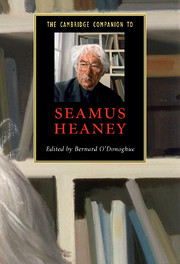Book contents
- Frontmatter
- 1 Introduction
- 2 Seamus Heaney’s Working Titles
- 3 The Context of Heaney’s Reception
- 4 Heaney in Public
- 5 Heaney and the Feminine
- 6 Heaney and Eastern Europe
- 7 Heaney’s Classics and the Bucolic
- 8 Professing Poetry
- 9 Heaney and the Irish Poetic Tradition
- 10 Irish Influence and Confluence in Heaney’s Poetry
- 11 Heaney and Yeats
- 12 Heaney’s Wordsworth and the Poetics of Displacement
- 13 Heaney, Beowulf and the Medieval Literature of the North
- 14 Crediting Marvels
- Guide to Further Reading
- Index
4 - Heaney in Public
Published online by Cambridge University Press: 28 March 2009
- Frontmatter
- 1 Introduction
- 2 Seamus Heaney’s Working Titles
- 3 The Context of Heaney’s Reception
- 4 Heaney in Public
- 5 Heaney and the Feminine
- 6 Heaney and Eastern Europe
- 7 Heaney’s Classics and the Bucolic
- 8 Professing Poetry
- 9 Heaney and the Irish Poetic Tradition
- 10 Irish Influence and Confluence in Heaney’s Poetry
- 11 Heaney and Yeats
- 12 Heaney’s Wordsworth and the Poetics of Displacement
- 13 Heaney, Beowulf and the Medieval Literature of the North
- 14 Crediting Marvels
- Guide to Further Reading
- Index
Summary
Writers, according to Seamus Heaney, ‘live precisely at the intersection of the public and the private’. One of the most direct statements of a public nature in his own poetry occurs in his pamphlet, An Open Letter. This Burns-stanza poem was written as a polite protest – jocose but entirely in earnest – at finding himself categorised as ‘British’ in the Penguin Book of Contemporary British Poetry, an influential anthology in which his work was accorded pride of place. Pride of place of a different kind provoked this normally celebratory poet into refusing to raise his glass, as he insisted, ‘My passport’s green. / No glass of ours was ever raised / To toast The Queen’ (OL 9).
An Open Letter was published by the Field Day Theatre Company (of which Heaney was a director) in Derry, a city with nomenclatural problems of its own. Ideal as a platform for a public statement of this kind, Field Day proposed – through plays, pamphlets and anthologies – a re-examination of fundamental assumptions about culture and identity in Ireland. What Seamus Heaney wrote of The Field Day Anthology of Irish Writing applied to the work of the Company as a whole – it aimed ‘to reveal and confirm the existence of a continuous tradition, contributed to by all groups, sects and parties active in the island’s history, one in which a more generous and hospitable notion of Ireland’s cultural achievements will be evident’. Read in this spirit, An Open Letter avoids narrow nationalism by the very tone it adopts – temperate and tolerant rather than grimly chauvinistic. While an Ulster Unionist’s reading is likely to be coloured by Heaney’s choice of passport, the poet himself – in the last of his Oxford lectures – preferred to envisage the poem conferring dual citizenship:
I wrote about the colour of the passport . . . not in order to expunge the British connection in Britain’s Ireland but to maintain the right to diversity within the border, to be understood as having full freedom to the enjoyment of an Irish name and identity within that northern jurisdiction . . . There is nothing extraordinary about the challenge to be in two minds. If, for example, there was something exacerbating, there was still nothing deleterious to my sense of Irishness in the fact that I grew up in the minority in Northern Ireland and was educated within the dominant British culture. My identity was emphasized rather than eroded by being maintained in such circumstances.
(RP 201–2)- Type
- Chapter
- Information
- The Cambridge Companion to Seamus Heaney , pp. 56 - 72Publisher: Cambridge University PressPrint publication year: 2008
- 1
- Cited by

